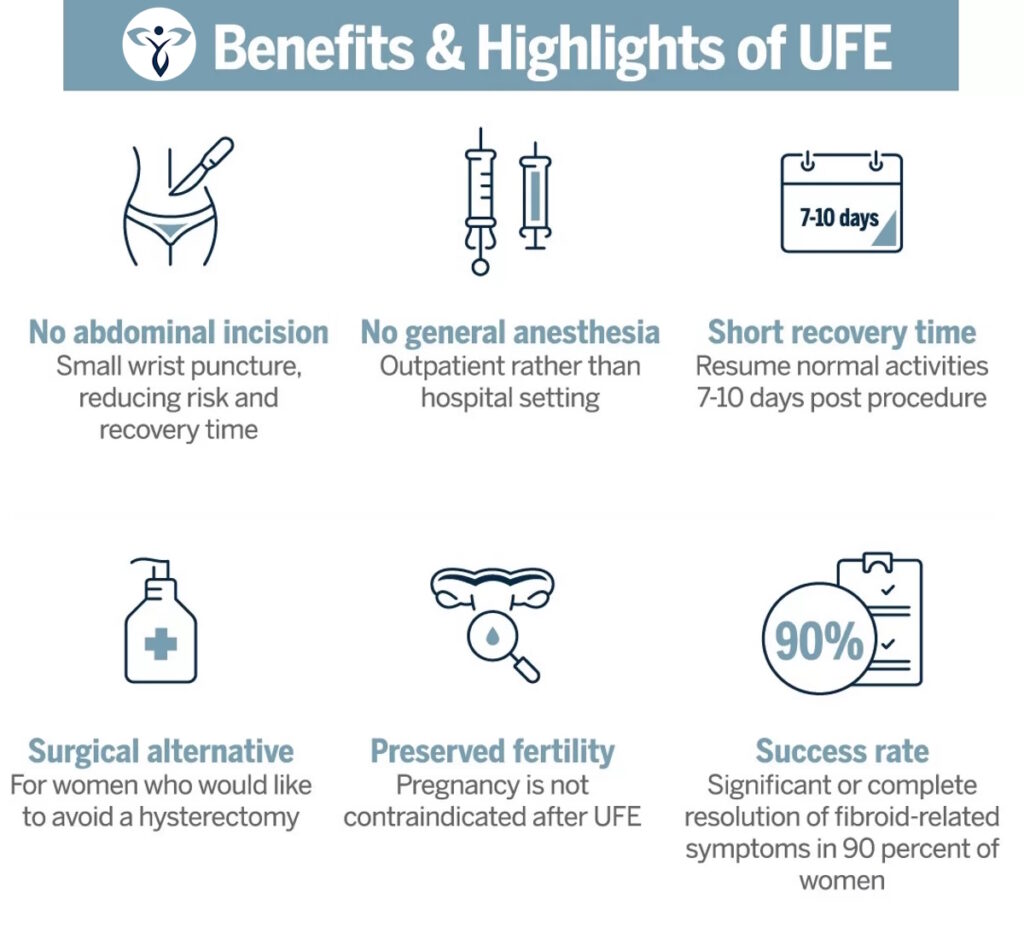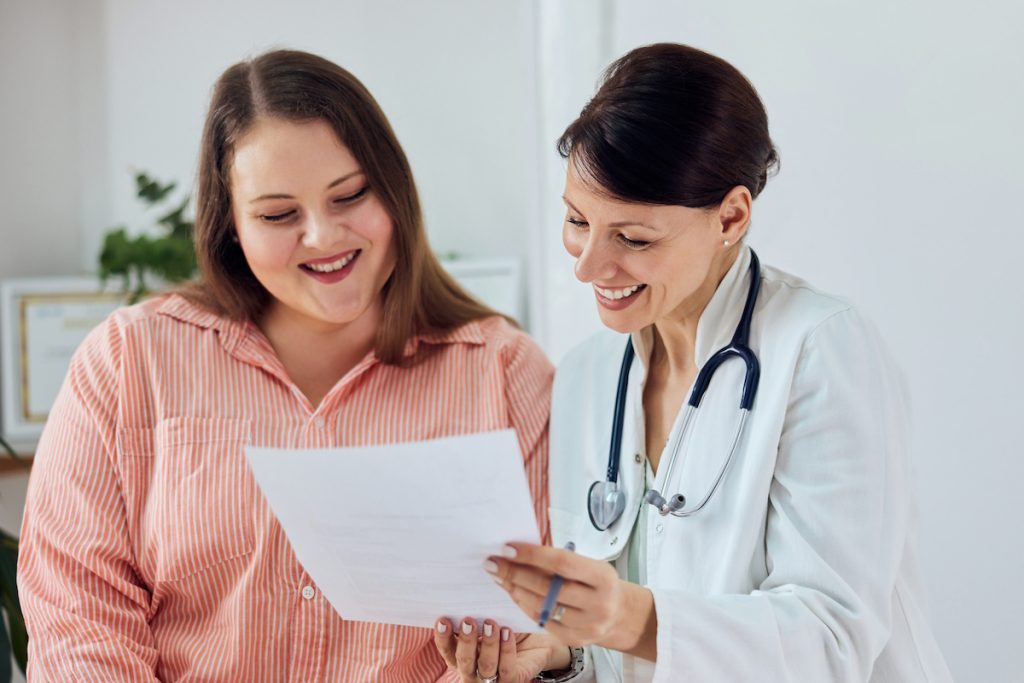If you or a loved one is considering uterine fibroid embolization (UFE) to treat your fibroids, it is natural to want to know what your recovery will look like and when you will feel well again. It is also normal to feel nervous about any fibroid treatment or medical procedure. However, you can feel at ease with Fibroid Institute, where our special after-procedure recovery protocol is second to none. That’s right—you will feel minimal discomfort when you follow our specific and patient-centered protocol, and your recovery time will span mere days instead of weeks.
To address the common concern of many patients who are busy with jobs and lifestyle demands but want to understand just how different UFE is and our unique approach, our UFE doctors put together a short guide to help you understand what to expect after your procedure. This will help demystify the entire process, allowing you to proceed with confidence.
Imagine UFE Ridding You Of These and Other Fibroid Symptoms
- Heavy, long or abnormal menstrual bleeding
- Painful periods, debilitating cramps, pelvic pain, and pressure
- Painful intercourse
- Fatigue and weakness
- Bloating or swelling in the lower abdomen
- Back or leg pain
- Urinary frequency, constipation, diarrhea, and rectal discomfort
What Happens During Uterine Fibroid Embolization?
Uterine fibroid embolization is the gold standard in non-surgical fibroid treatment. Rather than removing the fibroids, such as in a hysterectomy or myomectomy, UFE stops blood flow feeding all uterine fibroids—causing them to shrink and die. UFE is low risk, a faster procedure than fibroid surgery, and a reliable way to treat fibroids of all sizes and locations.
During a UFE procedure, our experienced interventional radiologists use X-ray guidance to pinpoint the fibroids and vessels feeding them. They insert a small catheter into the radial artery at the wrist and advance it to the location of the targeted area. Then they inject microscopic particles to block the blood flow to the fibroids, causing the fibroids to shrink and die. Patients can go home the same day and will experience a reduction in painful symptoms.
Advantages of UFE at Fibroid Institute include:
- Covered by most major medical insurance plans
- Over 90% of patients see dramatic improvement in symptoms
- No hospital stay and shorter recovery period (one week in some cases)
- Avoids side effects of pharmaceutical hormone therapies
- Tiny wrist puncture, no need for vaginal access
- Fibroid doctors are board-certified interventional radiologists
- In-office procedure instead of a hospital stay
- Procedure typically takes less than an hour
- Patients get direct access to their doctor’s mobile number

From a post-procedure standpoint, Fibroid Institute has developed a highly specific formula. As a result, our patients report little to no pain when they follow the recommended protocol. Furthermore, patients can expect to have regular monitoring with us. We make ourselves available—day or night—on the off chance that a patient needs our help, guidance, or emotional support.
We will see you one week after the procedure to assess your recovery. You will have additional post-procedure appointments at one month and four months. These are standard and designed to help us follow your progress.
UFE Recovery Timeline
Right After Uterine Fibroid Embolization
After the uterine fibroid embolization procedure, you will wake up with only a small bandage over a well-placed nick on your wrist. You may feel pressure in your pelvis during the first few hours after UFE. You may also feel as if you need to have a bowel movement right after the procedure, although most women simply need to empty their bladder soon after the procedure is done. These symptoms are all a normal part of your immediate UFE recovery.
- We will monitor you for 90 minutes before you go home.
- You must be able to empty your bladder before you leave.
- You can resume light activities as soon as you feel up to it.
If you have any cramping in your uterus, our team will give you medication to help control it and make sure that you are as comfortable as possible. Since you will receive sedating medications during UFE, you will need someone to drive you home the same day as the procedure. Once at home, you can manage any pain with medicines our doctors will prescribe to you before you leave our office.

The First 7 to 10 Days After Uterine Fibroid Embolization
Although you may not need it, we recommend taking at least a week off work to allow yourself to rest and recover. Most women who decide to undergo uterine fibroid embolization get back to work and their normal activities between 7 and 10 days after the procedure, which is a much shorter recovery time compared to a hysterectomy and other surgical options with require weeks of recovery. As you are recovering from UFE, you will continue to feel your uterus cramp for about five days after the procedure. You may also feel exhausted, have a low-grade fever, and vaginal spotting.
All these symptoms are normal and should lessen each day. Unless you are not feeling well, you can get back to your normal work, exercise, and daily routine after a week or two.
During recovery, we encourage you only to do what you feel up to doing. Give yourself permission to take it easy and give yourself time to feel better. You will be able to move around and walk normally, shower, and feed yourself. However, please avoid the following:
- Do not soak in a tub for two weeks.
- Do not lift more than five pounds for three days.
- Do not drive while you are taking pain medications or wearing a pain patch.
- Do not have sexual intercourse for two weeks.
If you have questions after the procedure or any symptoms, please feel free to call us at the clinic and ask to speak to the nurse practitioner. If you have an urgent issue at night or during weekends, we give all patients their fibroid doctor’s cell phone number to call directly.
Long-Term Care After Uterine Fibroid Embolization
As the months go by and you are recovering from UFE, you will notice that many of your uterine fibroid symptoms are disappearing or drastically getting better. After uterine fibroid embolization, more than 90% of women notice an improvement in their symptoms, such as less pelvic pain and lighter cycles.
Your first menstrual cycle may be heavier than usual. However, it will get much lighter, and your menstrual symptoms will improve over time. Most importantly, after a UFE, our patients report an improvement in their quality of life—a life with less bleeding, less back and pelvic pain, and more time to spend on the things that bring them joy.

Our Specialty is Uterine Fibroid Embolization for a Reason
It used to be that hysterectomy was the only option for women seeking relief from their uterine fibroids. And in some cases today, it may still be the best option for some women. That said, more women than ever before are standing up and exploring their options. They are seeking second opinions to ensure they have the correct information and can make informed decisions for their own healing journey. With the advancement of new technology, minimally invasive procedures such as uterine fibroid embolization have been thrust into the spotlight for their effectiveness and shorter fibroid treatment recovery times. The bottom line is that you do not have to worry about missing work and life events with every fibroid treatment procedure.
Becoming Fibroid Free with UFE Is As Easy as One, Two, Three …

Whether UFE is the right option for you or not, our team of fibroid doctors is always on hand to partner with you and your primary physician to determine the best course of action. At Fibroid Institute, we do not believe you need to decide between suffering in silence and having invasive surgery.
With multiple locations, our Houston and Dallas fibroid centers help thousands of women avoid fibroid surgery and find relief from their fibroid symptoms. At Fibroid Institute, we specialize in UFE because it delivers effective results in the least amount of time and with limited pain. On top of that, we simplify your UFE journey, managing everything from insurance to PCP communication and offering all patients physician-direct access before and after their procedure. Our fibroid doctors are board-certified interventional radiologists and experts passionate about helping women become #FibroidFree.
Request a free 10-15-minute phone screening to determine if you are eligible. If you qualify for UFE after the screening, you can schedule your on-site or telehealth consultation. Most major medical insurance providers cover the cost of UFE. We are dedicated to helping you become #FibroidFree. Get started now with Fibroid Institute Dallas at 214-838-6440 or with Fibroid Institute Houston at 713-903-3733 or complete the form below.
This information is not a substitute for professional medical advice. Before starting any new treatment or if you have questions regarding a medical condition, always seek the advice of your doctor or other qualified health provider.
Fibroid Institute Texas serves the Dallas and Houston areas including Hutchins, Irving, Duncanville, DeSoto, Cedar Hill, Lancaster, Cockrell Hill, Highland Park, University Park, Park Cities, Garland, Mesquite, Richardson, Dallas, Sherman, Houston, Sugar Land, Katy, Webster, Clear Lake, The Woodlands, Universal City, Spring, Kingwood, Stafford, Conroe, Texas City, Cypress, League City, Bellaire, Addison, Carrollton, Plano, Frisco, Craig Ranch, McKinney, Allen, Fort Worth, Grand Prairie, Hurst, Euless, Bedford, Arlington, and more.
*Patient names and/or photos may be changed to protect patient confidentiality.

